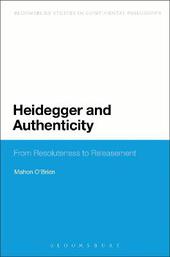
|
Heidegger and Authenticity: From Resoluteness to Releasement
Paperback / softback
Main Details
Description
Heidegger's thinking in the decades following the publication of Being and Time is often deemed irreconcilable with that work. Critics contrast the notion of "resoluteness" in Being and Time with Heidegger's post-war account of "releasement" in an attempt to establish a discrepancy between the allegedly voluntarist humanism of his early work and the supposedly 'anti-humanist' thinking of his later work. By contrast, Mahon O'Brien argues for the structural and thematic coherence of Heidegger's movement from authenticity to the search for an authentic free relation to the world - as captured by the term "releasement". By demonstrating the structural and thematic unity of Heidegger's thought in its entirety, O'Brien paves the way for a more measured and philosophically grounded understanding of the issues at stake in the Heidegger controversy.
Author Biography
Mahon O'Brien is currently IRCHSS Research Fellow in the School of Philosophy at University College Dublin, Ireland. He is the author of Heidegger and Authenticity: From Resoluteness to Releasement (Continuum 2011).
Reviews"An original look at one of the most discussed concepts of Heidegger's thought - and an interesting interpretation of the consistency of this thought." -- Krzysztof Michalski Mahon O'Brien's volume mounts a stirring defense of the fundamental continuity of Heidegger's thinking, centered in the concept of authenticity. Without discounting the evolving nature of Heidegger's thinking or ignoring l'affaire Heidegger, O'Brien demonstrates the constancy of Heidegger's summons to human beings to move beyond the constraints of anthropocentric metaphysics and relate authentically to things, letting them be. -- Daniel O. Dahlstrom, Chair, Professor of Philosophy, Boston University, USA Mahon O'Brien's Heidegger and Authenticity: From Resoluteness to Releasement represents an important contribution to Heidegger studies. By treating the question of authenticity as a central theme throughout Heidegger's work, O'Brien offers a compelling interpretation of Heidegger's thought as a continuous whole. O'Brien's careful readings will challenge the view that there is a radical break in Heidegger's development between the supposed metaphysical voluntarism lingering in early writings such as Being and Time and the putative new departure into releasement in the later period. Gregory Fried, Suffolk University, Boston, USA -- Gregory Fried
|